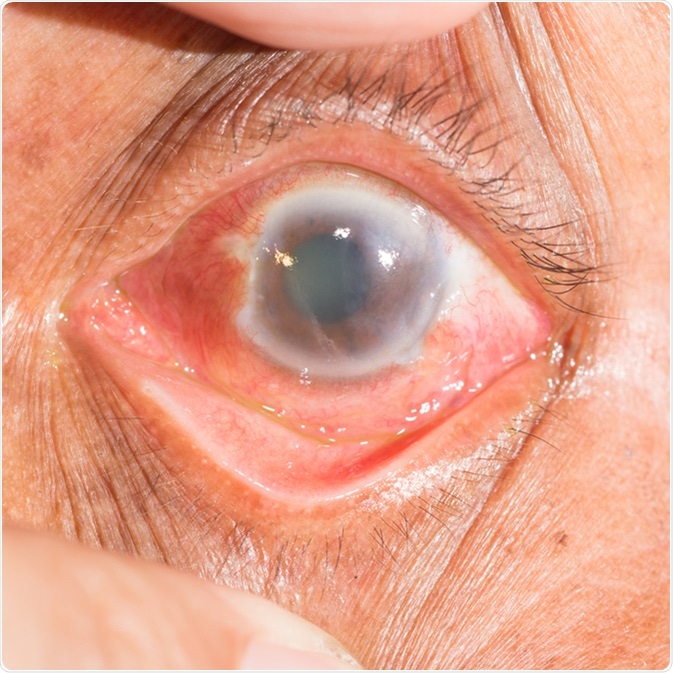What is Glaucoma?
Glaucoma is among the leading cause of permanent vision loss in most regions of the world. Damage to the optic nerve fibers resulting from glaucoma causes optic nerve cupping, which results in loss of vision and in some cases requires the removal of the eye.

Close up of the acute angel closure glaucoma during eye examination. Image Credit: ARZTSAMUI / Shutterstock
Incidence of Glaucoma
Glaucoma is the term for a group of conditions that cause the progressive degeneration of retinal ganglion cells within the retina. Glaucoma affects over 70 million people globally, making it the leading cause of irreversible blindness in the world. Glaucoma often does not produce any symptoms until it has become severe. Surveys show that only about 10% to 50% of individuals with glaucoma actually realize they have it.
Categorisation and Development of Glaucoma
Glaucoma is classified into two main categories, open-angle glaucoma, and angle-closure glaucoma, both of which cause primary glaucoma. Open-angle glaucoma is the most common form, but angle-closure glaucoma is responsible for more cases of very severe vision loss.
Secondary glaucoma can result from trauma, inflammation, tumors, medications (e.g. corticosteroids), and certain conditions (e.g. pigment dispersion). Many studies have discovered an increased risk of developing glaucoma with a higher cup-disk ratio (CDR), CDR asymmetry, hemorrhaging of the disc, or increased intraocular pressure (IOP). The risk of developing glaucoma is also increased in older individuals or those who have a family history of the disease.
Diagnosis of Glaucoma
Glaucoma is diagnosed on the basis of different tests. One test involves placing a simple mirrored instrument on the patient’s eye which allows for the examination of the angle using a biomicroscope. This technique is referred to as gonioscopy. Unfortunately, it is a very subjective method of assessment with poor reproducibility as the results may be affected by variations in the light levels and in the force of eye compression.
Imaging can be used to assess the eye for angle closure. Ultrasound biomicroscopy can provide real-time images of the eye with a resolution between 25 μm and 50 μm. This method allows for the visualization of most structures within the posterior region of the eye such as the anterior choroid.
Optic Nerve Cupping
Development of optic nerve cupping
The optic nerve is responsible for carrying information from the retina to the brain. Millions of retinal fibers bundle together to form the optic nerve and exit at the optical disc which is seen at the back of the eye. Individuals with glaucoma have increased IOP or consequent loss of blood flow to some regions of the eye, resulting in the death of optic nerve cells. The center of the optic disc (known as the cup) becomes larger, and the cup to optic disc ratio increases alarmingly. This process is referred to as optic nerve cupping. Most individuals do show some optic nerve cupping, but those with glaucoma suffer from much more severe cupping because of the disease.
Treatment of Optic Nerve Cupping in Glaucoma
A standard treatment for optic nerve cupping is to start with medical therapy. This is succeeded by laser trabeculoplasty, and then filtration surgery if necessary. If optic nerve perfusion is the main cause of the optic nerve cupping, medical treatment to increase the perfusion pressure will help to minimize further damage. Using medical treatments to lower the IOP will also help to reduce further damage to the optic nerve fibers within the optical disc. Laser trabeculoplasty is a procedure that can lower the IOP in glaucoma patients. It activates the immune system, so that macrophages are recruited into the trabecular meshwork tissue to remove debris.
The Heterogeneity of Glaucoma
Glaucoma is a disease with many different causes. Its heterogeneous nature has led to its expression at many different levels of severity between individuals. There are many ways in which the optic nerves can be damaged in glaucoma, resulting in optic nerve cupping. This is very harmful as it leads to extreme loss of vision in the affected eye. Treatment for optic nerve cupping takes many different forms depending on the severity of the disease and the factors that originally caused the optic nerve damage.
Research will lead to future improvements in glaucoma screening, diagnostics, and treatment. This will hopefully reduce the number of people with this condition who go undiagnosed.
Further Reading
Last Updated: Oct 8, 2018